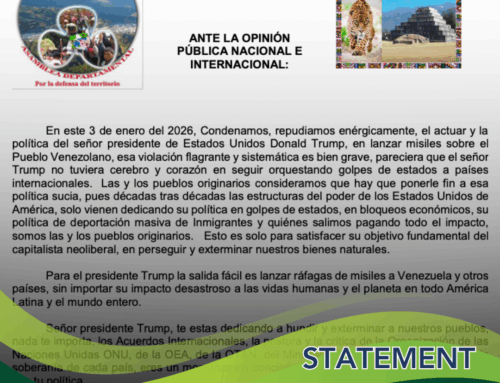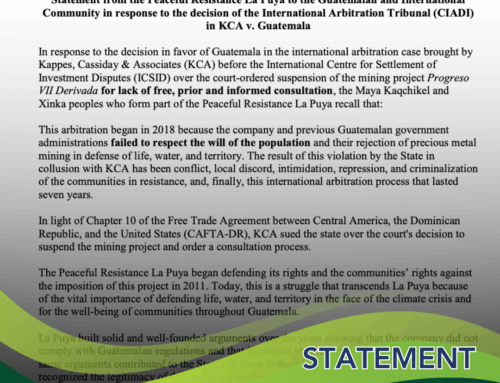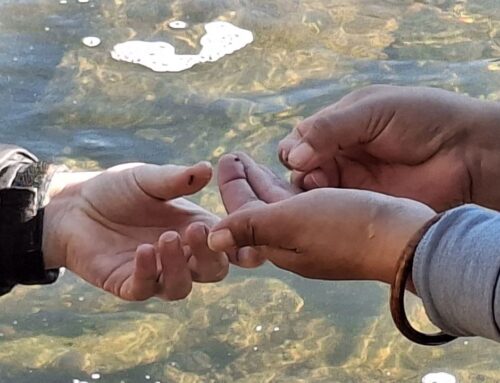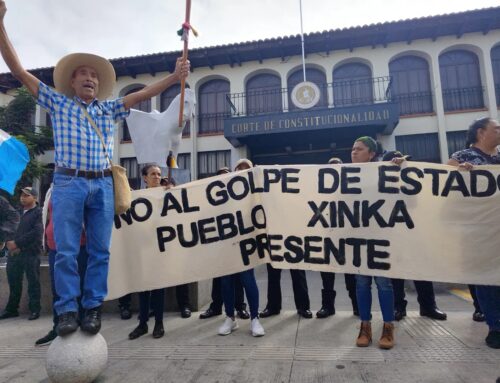As the kick-off to NISGUA’s 2018 tour, “How to Stop a Dam with Indigenous Resistance,” we travelled to Seattle on occupied Duwamish and Coastal Salish territories. Duwamish Tribal Chair Cecile Hansen and Jolene Hass generously welcomed Maya Mam activist José Gómez and members of the NISGUA network to the Duwamish Longhouse, to exchange strategies as Indigenous peoples and other environmental activists fighting for justice in the face of imposed resource extraction.
José Gómez organizes with the Association of Communities for Development and the Defense of Land and Natural Resources (ACODET) in the Ixcán region of Guatemala and is this year’s NISGUA tour speaker. Read more about this year’s tour.
The Duwamish Tribe has faced a long history of injustices, including the draining of the Black River, the channeling of the Duwamish River, the burning of the Duwamish Longhouses by settlers, city ordinances banning Indigenous peoples from living within Seattle city limits, and many others. Today, they continue to fight to obtain the rights and recognition due to them under the Point Elliot Treaty. Welcoming José to the Longhouse was an effort to center directly-impacted communities in the struggles for Indigenous self-determination and to strengthen grassroots alliances.
José Gómez is welcomed to Seattle with a song by Paul Cheoketen Wagoner and a gift of blankets from Duwamish Tribal Chair Cecile Hansen pic.twitter.com/lxbAPLyfwN
— NISGUA (@NISGUA_Guate) November 3, 2018
After a song and words from Paul Cheoketen Wagoner from the Saanich Tribe, José spoke on a panel with Kayah George of the Tsleil-Waututh Nation and Tulalip Tribe, Amelia Massucco of Mosquito Fleet, and Paulina López of the Duwamish River Cleanup Coalition.
- Kayah George of the Tsleil-Waututh Nation and Tulalip Tribes: As an indigenous person from the Tsleil-Waututh Nation in British Columbia, Canada, and the Tulalip Tribes of the northwest coast of Washington State, Kayah George forms part of a regional fight to protect the Salish Sea from pipeline expansion. In particular, she’s fighting against the Trans Mountain Pipeline – recently purchased for $4.5 billion by Canada’s federal government from Kinder Morgan Energy Partners. The current pipeline carries crude and refined oil from the tar sands in Alberta to the west coast of British Columbia. If plans for the Trans Mountain Pipeline Expansion are carried out, it will significantly increase the amount of tar sands moving through the Salish Sea, bringing a seven-fold increase in tanker traffic that will put the entire region at risk for spills, and greatly expand the market for some of the dirtiest oil on the planet. At the Longhouse, Kayah talked about the importance of remembering why we are fighting in the first place – grounding in spirituality and prayer as pillars to any struggle. She spoke about the power of bringing ceremony to sites we’re fighting to protect, as the land needs healing, and following sacred laws that dictate care for the next seven generations. Read her powerful op-ed in Teen Vogue here.
- Amelia Massucco of Mosquito Fleet joined the panel to talk about the direct-action environmental activists are taking to halt the export of oil, gas, and coal through the Salish Sea. Using kayaks and other water-based vehicles, members of Mosquito Fleet have played important roles using their “bodies and boats to obstruct the commerce and transport of fossil fuels in service of dismantling an extractive economy.” They focus on direct action support, training and skill-shares, and growing and maintaining a network of climate first responders, to “work in solidarity with the many impacted communities that depend on the water for their livelihood and their life-ways, including indigenous communities of the Salish Sea, organized labor, fisher-people, and families.” Read more about Mosquito Fleet’s mission here.
- Paulina López of the Duwamish River Cleanup Coalition: In 2001, the Duwamish River was declared a federal Superfund Site, recognized as one of the most hazardous waste sites in the United States. Since then, the EPA has released proposed plans for clean-up, but Paulina and others that form part of the Duwamish River Cleanup Coalition are fighting to make sure that people most impacted by the pollution of the river are an integral part of the decision-making processes. Read more about the Cleanup Coalition.
As part of the panel, José described the work of ACODET – a coordinating body that brings together majority Indigenous Maya Q’eqchi’ communities, as well as Maya Mam and Q’anjob’al-speaking communities in three regions of Guatemala. For over a decade, communities in the Ixcán have fiercely resisted the imposition of the Xalalá Dam and have successfully organized to prevent the megadam from being built. In late 2014, the Guatemalan government cancelled the geological feasibility studies contract with Brazilian company Intertechne – a necessary precursor to the dam’s construction and a process that was fraught with anomalies and a lack of consultation with indigenous communities. The government’s decision to cancel the contract, and the 2016 Constitution Court decision that affirmed the cancelation, has effectively stalled the project.
As part of the panel, however, José talked about the communities’ strategies to stay vigilant to prevent renewed construction on the megadam or any type of modification to the project that would push it forward. Part of their strategy is to continue to re-affirm, year after year, the results of the 2007 referendum in the Ixcán where 89% of participants voted against the presence of large-scale hydroelectric dams and oil exploitation in their territories.
An organizing process analyzed areas at risk from the dam project and carried out capacity building and outreach to affected communities. The consultation was carried out according to local decision-making customs. pic.twitter.com/KPPc8TpADd
— NISGUA (@NISGUA_Guate) November 3, 2018
#NISGUATour Day 5: After engaging 300+ people in Seattle (including approx 200 elementary school students) in conversations about #IndigenousResistance, we’re heading to Bellingham, neighboring the Lummi Nation, for a presentation at @WWU. Join us! pic.twitter.com/na5HTGChSl
— NISGUA (@NISGUA_Guate) November 7, 2018
José speaks with Talking Stick TV on Seattle Community Media
Reflecting on his visit to Seattle and Duwamish and Coastal Salish territory, José said:
“Our first meeting of the tour was very impactful – meeting with the Duwamish Tribe and hearing about the ways they, too, relate to the earth and water. I was impressed to hear [Paul Cheoketen Wagoner of the Saanich Tribe] mention that in the past, their parents and grandparents would ask permission from the river before bathing in it. One realizes that here, people are trying to continue this type of relationship and ancestral customs.
Same with the other students. I appreciated how each one of them heard our message and reflected upon it. An 8-year-old child asked me how he could get involved in my struggle and become involved in our work. The youth and children [we met with] realize that defending the rivers and defending the mountaintops is something important for us – as people.
Afterwards, we heard about other struggles from Latino, campesino, and Indigenous people here in Seattle and Bellingham. We saw how they organize, how they formed their unions and cooperatives to have a better life and have more access to non-exploitative work. It is impressive to listen to them describe in their own words how they have organized and what the process has been like to enter into dialogue with companies – none of which has been easy. But they said that it was thanks to their collective work and the sacrifice each person has made that they now have a large organization. I feel strengthened by these experiences we have had on this first stop of the tour.”
Ways to take action
Indigenous communities in the Ixcán, Cobán, and Uspantán regions of Guatemala wrote a statement to the Guatemalan government and diplomatic corps demanding respect for their right to decide what happens in their communities. At the request of the authors, NISGUA invites Indigenous and Indigenous-descendent individuals and Indigenous-led organizations to add their signatures. Read the full statement here.
To sign on, please email NISGUA’s Guatemala Programs Coordinator, Becky Kaump, at becky[at]nisgua.org. For individual signatures, please include name, location, and, if desired, tribal and/or organizational affiliations. For tribal or organizational signatures, please include the name of your tribe or organization and your location. Signatures will be collected as long as the statement is open.
We have an additional petition for non-Indigenous allies to sign a separate petition in solidarity. Click here to sign.






Leave A Comment